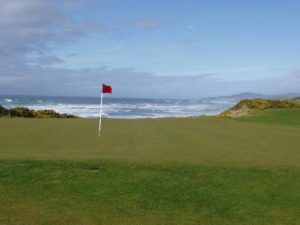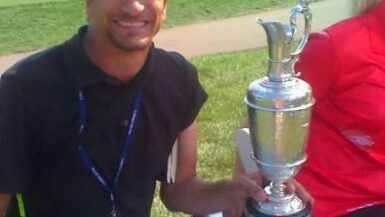It’s been a great few weeks for Golden Age golf architecture on the PGA Tour. With all the world enjoying Pebble Beach, Riviera and the other crown jewels that the West Coast has to offer, it’s a good time to take a closer look at some of the best tournament venues we’ll see this year from not only the PGA Tour, but from the USGA and PGA of America as well.
There are some old favorites, a few impressive debuts and a handful of instant classics all making appearances this year.
2020 US Open: Winged Foot West
The USGA outdid themselves this year with a bumper crop of exceptional courses for their events, led by Winged Foot’s legendary West Course. The Yankee Stadium of golf, but also the Graveyard of Champions – Watson, Nicklaus, Woods, Mickelson, Snead, Sarazen, Hagen, Hogan and countless others have been led to their tombs by the merciless ghost of U.S. Opens past.
Relentless is the best way to describe the West course. The golfer is on high alert for a disaster at any moment. Brutally long, any tee shot that lands in the rough means near-certain bogey and potentially much worse. And the oceanic greens – perhaps the largest Tillinghast ever designed – have so many hollows, swales and false fronts, the slightest mistake in the short game will be ruthlessly punished by a walk of shame. Director of Grounds Stephen Rabideau has the myriad defenses of Gil Hanse’s restoration firing on all cylinders; there will be many high profile flame-outs. If there’s one thing guaranteed at Winged Foot, it’s Shakespearean in magnitude drama. Just ask Phil.
Watch for this: The West course’s only short hole, the 320-340 yard sixth is the likely candidate to have the tees moved forward to encourage driving the green. They even removed the left greenside bunker to tempt the players further. The only wrinkle? Short and left brings a creek and small water hazard into play, more than ever before in fact. But that’s the way a great short par-4 is supposed to play: a 2 or a 7.
2020 USGA Fourball: Philly Cricket Club

A masterstroke on the part of the USGA, amateurs can now compete in a two-person team event for a national championship: 36 holes of stroke play qualifying for a match play bracket.
Moreover, these amateurs are just like us: They have regular jobs, homespun families, mostly fly coach and have an elevated sense of golf history and ethos. Best of all, they’re grateful. They’re inspiring to be around, and watching them live gets you closer to the action than any other major sporting event. This is the beating heart of the game, unspoiled by sponsorships, PR spin and commercialism.
This year the world gets a close-up look at another Tillinghast masterpiece: Philly Cricket Club’s fabled Wissahickon course. Originally designed in 1924 by Tillie, he had intended the course to be a work in progress, making changes gradually over time. But a few short years later, the course underwent significant alterations by another giant of architecture, William Flynn, and then later by other hands as well. Soon, much of what Tillinghast has designed had been mulled and muddied. But at least the bones were still there.
Cut to 2014 and the club had hired restoration and renovation specialist Keith Foster to recreate what Tillie would have done. His work was masterful, perhaps the single most faithful restoration of a Tillinghast course to date. The 14th hole’s new “Hell’s Quarter Acre” hazard, for example, is a masterstroke as a bookend to Tillinghast’s “Hell’s Half Acre” that strategically bisects the par-5 seventh fairway.
The stroke-play portion of the competition will also be contested on the club’s Militia Hill course, a Dr. Michael Hurdzan design. Militia Hill is slightly too hypermodern for my personal taste, but the members love it. Long fierce rolls, expansive water hazards, and a huge, wide playing field, it will be a stern test as well.
Watch for this: One can only hope that the Mid-Am is a warm-up for a future U.S. Open. Merion – rare and wonderful as she is – is just too small to host the gargantuan event the U.S. Open has become. Philly Cricket, on the other hand, has plenty of space…enough to even grow the footprint, rather than shrink it to fit.

2020 U.S. Amateur: Bandon Dunes Resort
Literally clinging to the edge of the Western Hemisphere, every golfer on the planet needs to make the pilgrimage to the southern coast of Oregon and the Bandon Dunes Golf Resort. Four 18-hole courses — with a fifth coming in June — and a 13-hole par-3 course are laid out over two-and-a-half miles of pristine Pacific Ocean coastline. You play golf along the cliff-tops, while sea lions bark mournfully below you on the beach. Every hole is a postcard, but they are all designed by masters of strategic architecture.
The match play phase of the Am will be contested on David McKay Kidd’s Bandon Dunes course, the first and flagship course of the resort. Bill Coore and Ben Crenshaw’s Bandon Trails course will be the stroke play co-host. Last year, the other two 18 hole layouts, Old Macdonald and Pacific Dunes, hosted the Fourball.
Bandon Dunes is the most important and influential public golf course built in this country since Sawgrass. Mike Kaiser proved the adage true – if you build it they will come.
Other 2020 USGA highlights
Hazeltine National will host the Junior Boys, and the whole state of Minnesota will race to volunteer for the event. Year in and year out, they support golf with inspiring fervor and dignified grace and class. Hazeltine will also again host a Ryder Cup in 2028.
The Women’s Open draws Champions Golf Club in Houston, where in 1969 unheralded but popular Orville Moody – the pride of Chickasaw County, Oklahoma! – held off Deane Beman, Bob Rosburg and Al Geiberger to win the Open and tally his only PGA Tour victory. Known to his friends as Ol’ Sarge for his U.S. Army days, he also won the All-service championship and three Korea Opens.
The U.S. Mid Amateur comes to modern classic Kinloch Golf Club, a Lester George design. The Mid-Am is a far more important and respected tournament than the casual fan realizes. Never forget that the winner of the Mid-Am gets invited to play in the Masters.
102nd PGA Championship: TPC Harding Park
Sometimes the PGA of America deserves resounding applause for its choice of venue for the PGA Championship (Baltusrol, Oakland Hills, Bethpage Black) and sometimes they have us scratching our heads (Atlanta Athletic Club, Valhalla). TPC Harding Park will get its trial by fire this May, and we’ll all see how well it holds up against the best players in the world. Yes, it hosted a Presidents Cup in 2009 and will host another in 2025. It also hosted the WGC Match Play in 2015 won by Rory McIlroy.
But stroke play and match play are completely different. With neither the reverse camber of Olympic Club, nor its curvaceous greens, TPC Harding Park must find different defenses to scoring. We’ll have more on that subject in our PGA Championship preview, when we’ll interview Kerry Haigh, the PGA of America’s championship set-up maven.
“Kerry’s the best in the business,” praised quintessential golf architect Rees Jones, who has been the consulting architect for over 25 major championships. “His work is popular with the players, because his setups are tough, but fair.”
2020 KPMG Women’s PGA Championship: Aronimink Golf Club
Aronimink sure gets around. It hosted a PGA Championship in 1962 (won by Gary Player), a U.S. Amateur in 1977, and then a Senior PGA Championship in 2003, before the PGA Tour used it for two years for the AT&T National and recently for the BMW Championship. One of Donald Ross’s most indelible masterpieces, this year’s Women’s PGA will also set the table for the club hosting the PGA Championship in 2026.
2020 Ryder Cup: Whistling Straits
If anyone can give the Minnesotans a run for their money as the nicest people in America, it’s the Wisconsinites. Perennially Nos. 1 and 2 in golfers per capita, we’re in for a home field advantage that might be only second to Bethpage four years from now.
As an example, during the 2010 PGA Championship, a girlriend and I were passing by the 17th hole when suddenly there was the sound of jet engines taking off all around us. The longest, loudest, most sustained scream you ever heard or ever will hear on a golf course – not a cheer, a full-throated shriek of joy reverberated for about 30 seconds.
“I bet that was a hole in one,” I said to the girl.
“How you know?” she asked.
“That hole is a par-3. It’s either a hole in one, or Tiger did something magical…and Tiger finished already. So…”
Sure enough, Tom Lehman was waving to the crowd after picking his ball up out of the hole. How does that old commercial go? Not having to putt? Priceless.
Watch for this: All our sources thus far confirm they’re going to have the rough short, the fairways wide, and all bunkers will be waste bunkers, that way the players can ground their club (especially Dustin Johnson and Patrick Reed). They have to set it up as friendly and forgiving as they can for the American bomb squad. If the wind blows – as it tends to do off Lake Michigan, a flummoxing cross-wind at that – that tips the scales back to the Euros, who play more links golf than their U.S. counterparts.
2020 Rocket Mortgage Classic: Country Club of Detroit
Originally a Colt and Alison classic, CCD was redesigned in 1952 by Robert Trent Jones, Sr., only to be recently re-restored back to the original Colt and Alison design by Tom Doak. It has hosted two U.S. Amateurs 1915 and 1954, won by Robert Gardner and Arnold Palmer, respectively. The tournament will be played over the final weekend in May, while the Memorial gets moved to June.
2020 BMW Championship: Olympia Fields
Ever since it got torched by the field in the 2003 U.S. Open, Olympia Fields’s star has waned. “Olympia Yields” they dubbed it, and the search has continued for a Midwest venue to host the Open on an informally rotating basis. (I keep shouting “Oakland Hills,” but it appears that’s much too good an idea…)
Still, the club has an illustrious past, one they are trying to rekindle through a renovation project to both the North and South Courses. After working with Keith Foster for a number of years, they recently selected Andy Staples to continue the work.
Founded in 1915, it hosted its first major just five years later – the 1920 Western Open — and proceeded to hold that event four more times. The winner’s circle looks like a golf pantheon: Jock Hutchinson, Walter Hagen, Macdonald Smith, Jack Nicklaus and Bruce Crampton. That’s four immortals out of five.
The club also held two U.S Opens (1928, won by Johnny Farrell, and 2003, won by Jim Furyk), two PGA Championships (1925, won by the aforementioned Hagen, and 1961, won by Jerry Barber), and well as Bryson DeChambeau’s 2015 U.S. Amateur Championship.




